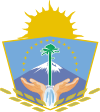Neuquén Province
| Neuquén | |||
|---|---|---|---|
| Province | |||
|
|||
 |
|||
| Country | Argentina | ||
| Capital | Neuquén | ||
| Divisions | 16 departments | ||
| Government | |||
| • Governor | Omar Gutierrez | ||
| • Senators | Guillermo Pereyra, Marcelo Fuentes, Lucila Crexell | ||
| Area | |||
| • Total | 94,078 km2 (36,324 sq mi) | ||
| Population (2010) | |||
| • Total | 551,266 | ||
| • Rank | 16th | ||
| • Density | 5.9/km2 (15/sq mi) | ||
| Demonym(s) | Neuquino | ||
| Time zone | ART (UTC−3) | ||
| ISO 3166 code | AR-Q | ||
| Website | neuquen |
||
Neuquén (Spanish pronunciation: [neu̯ˈken]) is a province of Argentina, located in the west of the country, at the northern end of Patagonia. It borders Mendoza Province to the north, Rio Negro Province to the southeast, and Chile to the west. It also meets La Pampa Province at its northeast corner.
The Neuquén Province receives its name from the Neuquén River. The term "Neuquén" derives from the Mapudungun word "Nehuenken" meaning drafty, which the aborigines used for the river. The word (without the accentuation) is a palindrome.
Inhabited by Tehuelches and Pehuenche, the territory was initially explored by conquistadores coming from Chile. In 1670 a jesuit priest established in Chiloé Archipelago, Nicolás Mascardi, founded the Jesuit mission Nuestra Senora de Nahuel Huapi. The jesuit missions lasted few years and the last mission in Neuquén was destroyed in 1717. The suppression of the Society of Jesus in 1767 halted further missionary activity. The Neuquén area came under Argentine influence after explorer Perito Francisco Moreno made several trips to Patagonia and made accurate descriptions of the area in his book "Viaje al Pais de las Manzanas", reaching Nahuel Huapi lake in 1875.
...
Wikipedia


